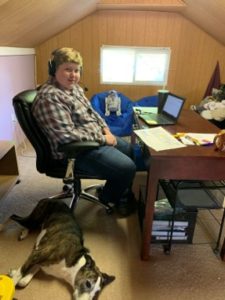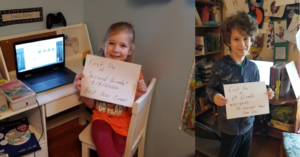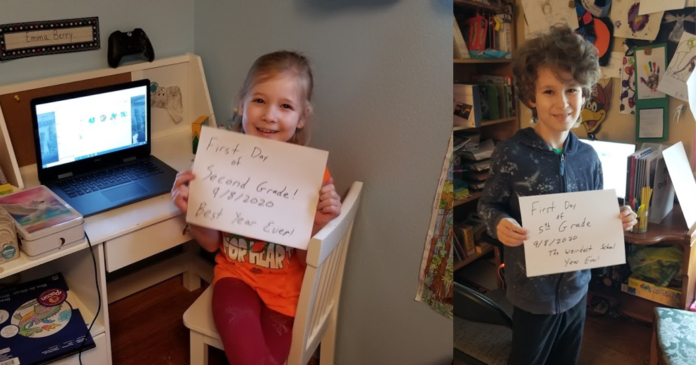By Kiyomi Kishaba
Opinion Editor
The Friday before Labor Day weekend, Bridget Yaden, PLU professor of Hispanic Studies, called into her work meeting from a rest stop along I-5 on the way to a family camping trip. In the back of the car, her teenage son phoned into his eighth grade class. Yaden is one of many professors juggling virtual teaching with the virtual learning of her kid, and trying to stay sane along the way.

Yaden wakes up an hour before her son so she can peruse the news, soak up some caffeine, and shower in the quiet of the morning. She counts herself lucky to have an older kid who is relatively independent throughout his daily six periods of Zoom classes, and tries to structure her schedule so they can have lunch together. Of course, between teaching two classes and onslaughts of meetings, that isn’t possible every day.
“The hardest part is the social aspect – he misses his friends,” Yaden explained. “At lunch ‘recess’ he wants me to go outside and play catch or walk, but I can’t always do that.”
Amy Young, professor of Communication, has a kid in eighth grade as well, and another in fifth. When she rolls out of bed in the morning she throws on workout clothes, “because if I don’t do it in the morning, it never happens,” she said.
Between herself, her kids, and her husband, she has four people bustling around the house who wake up to different alarms, attend varying Zoom calls, and eat at separate meal times. Work spaces in the office, at the bar counter, and in the living room are divvied up and rotated by the day. Amongst Young’s Zoom calls and department meetings, she tries to have lunch out by 11:30 a.m. so the kids can come eat on their different lunch breaks.
Young has a similar approach to teaching from home and helping her kids learn from home. She helps her kids with time management by keeping a print-out of their schedules next to their desks, and makes sure they have a work space just for school.
“The advice for working from home is really the same if you’re 11 or if you’re 45, so we’re all kind of doing this together,” Young said.
Even though Greg Johnson, professor of Philosophy, is on sabbatical this semester, he’s had his fair share of working from home with his three youngest kids learning online. With children ages six, four, and one, “eating every twenty minutes, not sharing much of anything, melting down, then soon after running around like they are the happiest,” he and his wife have their hands full.
Johnson has a PhD and his wife has an MFA, but when his first grader asks him for help on math, he says, “Go ask your mom!” Like Professor Young, Johnson uses similar tactics from online teaching he’s done at PLU in the past to help his children stay interested in their online school. He utilizes as many online resources as possible, like YouTube videos and movies, to supplement the regular lessons done by his kids’ teachers.

The amount of effort going into preparation for teaching online classes is, according to Young, “300% harder than my usual 110% to create courses.” She wants students to know, “we [professors] are all working our asses off to make this great for you,” as exemplified by these professors teaching Lutes and aiding in their children’s online learning simultaneously.
For Johnson, he hopes PLU students pause to look at and learn from their surroundings. The actions students and faculty take now will shape how they respond to similar situations in the future.
“Developing resources for engaging ambiguity, failure, uncertainty and how to live together in demanding times does not go away,” Johnson said. “We are all Sisypus rolling a rock up the hill, only to have it come right back down demanding for us to roll it again.”
For Neva Laurie-Berry, professor of Biology, “living together in demanding times” means taking a hands-on role in ensuring her kids are in the right class, with the right tools, at the right time. With a fifth-grade son and second-grade daughter, Laurie-Berry spends much of the day running between her son’s work area in the family room, her daughter’s room upstairs, and her workspace in the basement.
Laurie-Berry makes sure to begin each morning with a healthy breakfast: “Starting the day with solid nutrition is important with everything we have ahead of us!” Chaos begins immediately with her spouse leaving for work, her son starting class at 8 a.m., then her daughter at 8:45. After working in the basement for an hour, she runs up to her daughter’s room and prepares her notebook, worksheets, whiteboard slate, and math cube manipulables.

During a Zoom meeting a couple weeks ago with her Natural Science colleagues, Laurie-Berry’s daughter flew into the room in tears. When asked what was wrong, she sniffled and said she’d broken her math homework. Laurie-Berry excused herself from the meeting and discovered her daughter had deleted the answer box on the google slides. She showed her how to use the undo button and saved the day.
Working from home allows a glimpse into the lives of coworkers and peers, helping us to gain a new perspective of who they are as people. Laurie-Berry has been consistently struck by the understanding and accommodating nature of her colleagues, students, and her children’s teachers when faced with issues such as the broken math homework. She appreciates giving, and being given, grace.
“If there is any positive outcome from this pandemic, I hope that it’s a continuation of remembering to view each other as whole people with complex lives that extend beyond the roles where we encounter each other,” Laurie-Berry said.


















